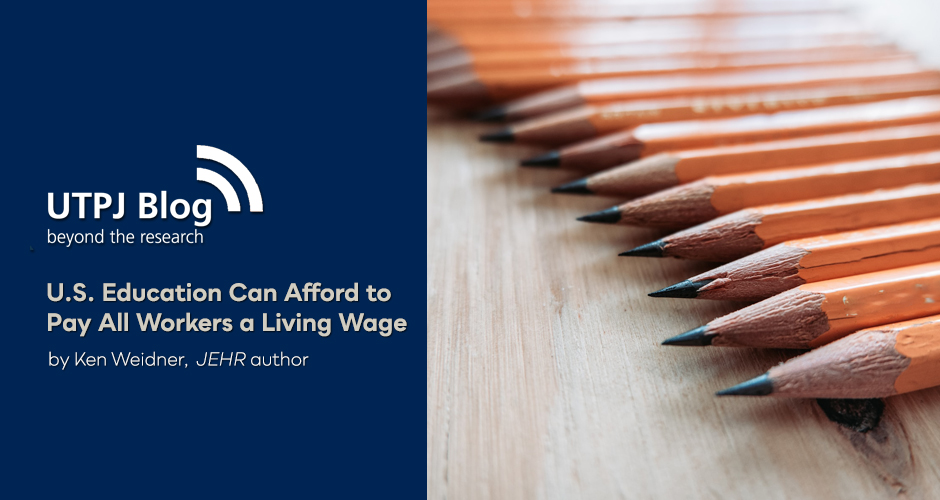
Written by guest blogger Ken Weidner.
My article in the Journal of Education Human Resources (JEHR) comes from my long-term research project, the Living Wage Policy Study (justwage.org), through which I study how higher education institutions (HEIs) in the U.S. pay and treat their most vulnerable, lowest-paid workers. In this article, I report on the development of an assessment I created and use to evaluate an institution’s policies that most affect both employers and workers employed by contractors to which schools have outsourced on-campus functions.
For several years, higher education presidents and CFOs in the U.S. have emphasized “sustainability,” not in terms of the institution’s impact on the natural environment, but in terms of developing an institution’s “sustainable business model” — by any other name, the “financial sustainability” of the institution. My research examines several dimensions of just employment, but among the most prominent is whether the lowest-paid workers in higher education are paid enough to maintain the financial sustainability of their households. The leaders of some institutions have given the latter question a great deal of thought and enacted policies that ensure workers are paid a living wage and treated with dignity; the leaders of many other institutions may or may not have considered the issue, but have not adopted such a policy.
If institutions that have enacted living wage policies were endangering their financial strength or operating margins in a material way, we would expect to see those institutions’ bond ratings suffer. However, bond ratings for those institutions aren’t declining, in large part because the incremental funds necessary to bring lowest-paid workers to a living wage are relatively small, typically less than .5% of an institution’s revenue. In short, paying a living wage appears to be affordable for medium- and larger-sized institutions. Smaller institutions face greater challenges, as they have to perform all of the same functions as larger institutions with fewer economies of scale.
The COVID-19 pandemic accelerated change in and intensified pressures on HEIs, especially tuition-dependent institutions, which face challenges related to both revenue and expenses. Revenue challenges include the shrinking population of high school graduates, public opinion of higher education, and the spiraling cost of a college education. Those costs are not increasing more than the rate of inflation because HEIs are overpaying their least-paid employees. With increasing pressure on institutional expenses at a time of constrained revenue, workers in the lowest-paid jobs are feeling especially vulnerable in a time of heightened uncertainty.
What we don’t know is how higher education as a whole — and individual institutions — emerge from this pressurized environment. Some will no doubt continue their historical treatment of workers as ends and not as means to an end. Other institutions may back away from past commitments to a living wage.
It is often said that budgets are documents reflecting choices made by leaders. My earlier research has shown that leaders can choose to pay workers a living wage, and can require their contractors to do the same. The small but growing number of institutions that have made this choice suggests that institutions large and small, public and private, in states across the American political spectrum, can pay their workers a living wage and treat their workers with dignity and respect, and can afford to do so.
About the Author
 Ken Weidner is assistant professor of Management at Saint Joseph’s University in Philadelphia. In addition to his research on living wages in U.S. higher education, among his other research interests are leadership and change, and student-centered pedagogy in business ethics, leadership, diversity, and ethics.
Ken Weidner is assistant professor of Management at Saint Joseph’s University in Philadelphia. In addition to his research on living wages in U.S. higher education, among his other research interests are leadership and change, and student-centered pedagogy in business ethics, leadership, diversity, and ethics.
Social Media and email:
www.linkedin.com/in/ken-weidner
https://www.justwage.org
bit.ly/KenWeidnerSJU
weidner@sju.edu
Comments on this entry are closed.